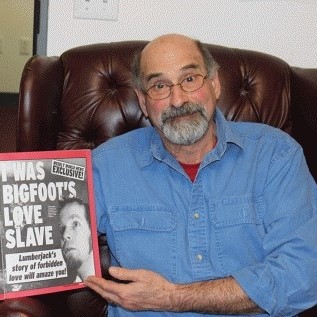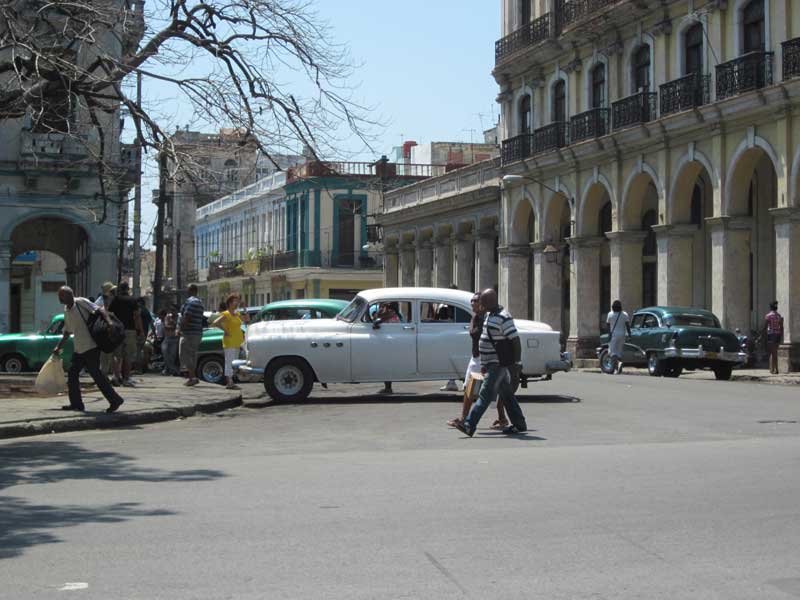Cuba trip planned for April break
A Havana street scene
This spring, a group of students and teachers will travel to Cuba and immerse themselves in the culture of Havana as part of a 3-credit course, “The Art and Culture of Cuba.”
Approximately 12 students will be selected to participate in this one-week trip taking place during spring break in April 2013.
This class was offered for the first time two years ago and was a great success. This spring, the class will be spearheaded by Professor of Fine and Performing Arts, Ken Leslie and Associate Professor of Writing and Literature, Tyrone Shaw.
Shaw has a long standing relationship with Cuba dating to 1991 when he was there to write a magazine article. While there, Shaw met Pedro Rodriguez, who is now “our man in Havana,” and is responsible for the logistics of the trip on the Cuba end.
“I met Pedro Rodriguez at a beach, we were waiting for a bus, and started talking,” said Shaw. “He looked like this surfer dude and he was with four of his friends, one of which who had just gotten out of jail for attempting to escape from Cuba on an inner tube raft, and we began a friendship that has been ongoing and constant since then…
“He [Pedro] is now the Cuban representative for a German salsa touring company ‘ViaDanza’…so he has all these [travel] connections and takes care of all the transfers once we get to Havana, and he has a very large network of bed and breakfasts. He also knows the city well and is absolutely 100 percent reliable. Then there is Pepe Guidin, who is my other long-time friend down there. He is our protector… and guide. He knows other aspects of Havana that Pedro doesn’t and between the two they are very complementary.”
Since 1960 Americans have been prohibited from trading with, investing in, or traveling to Cuba. This U.S. imposed embargo was in response to Fidel Castro, Cuba’s President’s close relationship the Soviet Union.
Because of changes in the embargo restrictions initiated by President Obama in 2010, faculty and students are able to travel to Cuba with government permission. Since the class is credit-bearing and affiliated with a degree-granting institution, JSC students have the opportunity to go.
In part because of previously established connections, the cost of this trip will be relatively low, approximately $1,800 including airfare, transportation, accommodations, meals, and activity admissions (the cost is still being finalized).
“The application process is not very complicated,” said Leslie. “We are going to want your name and how to contact you. We will ask about your traveling experience, but it’s not as if we would favor someone with more travel experience. We are just trying to get to know you a little bit. We want to know if you have a passport or not. We want to know your expected date of graduation, because if we have way too many applicants we might pick someone who is in their last year instead of someone in their first because that person would have more opportunity in the future.
“We will want to know what your major is, because we want to get a variety of students, we don’t want them all to be art students or all be journalism students. We ask why you want to do the trip…and what kind of creative project you are thinking of pertaining to Cuba. And we ask you to list a faculty reference because we may not know you and we want to make sure everybody has a chance.”
As for the creative project Leslie says it can be anything from painting a series of paintings of Cuba to writing a non-fiction piece, to choreographing a dance that will be due at the end of the semester.
Students will meet several times before and after the trip and will be assigned a film list in addition to a reading list prior to the trip. “We do want you to have a lot of background before you go, and it is so much more exciting that way too,” said Leslie.
Students will fly out of Montreal, Quebec, to Havana, Cuba.
While in Havana everyone will be housed in bed and breakfasts along the same street in the historic district of Old Havana. Every day there will be time set aside for students to explore and take initiative in their individual field work. The group will also experience a baseball game, one of Cuba’s favorite pastimes, as well as salsa dancing lessons.
Each day is scheduled to be filled with art, music and extraordinary culture in a way only Havana can deliver.
An informational meeting about the trip will be held on Sept. 26 in the VAC Room 124 at 3:30 p.m. and the application deadline is Nov. 1. Students who have questions can contact Leslie or Shaw for more information.
“When Cuba opens up to America it is going to become a very different place very, very quickly…” said Shaw. “Havana is remarkable for a lot of reasons – its architecture, its vibrant culture, and, for the moment, because there are no Americans. Once this obscene embargo is finally lifted and American franchises and business gets their hooks back into Cuba, it is going to be a very different place. And I think it would be a shame not to be able to experience it before that happens. And it will happen.”
Lindsay Brown joined the Basement Medicine staff in fall 2012 as a general assignment reporter. She continued in that position in spring 2013 and will...

Author, Law-Abiding Samaritan, Retired Writing and Literature Professor and Department Chair
Simply hasn't grown up yet (as far as we know)
I appeared...



